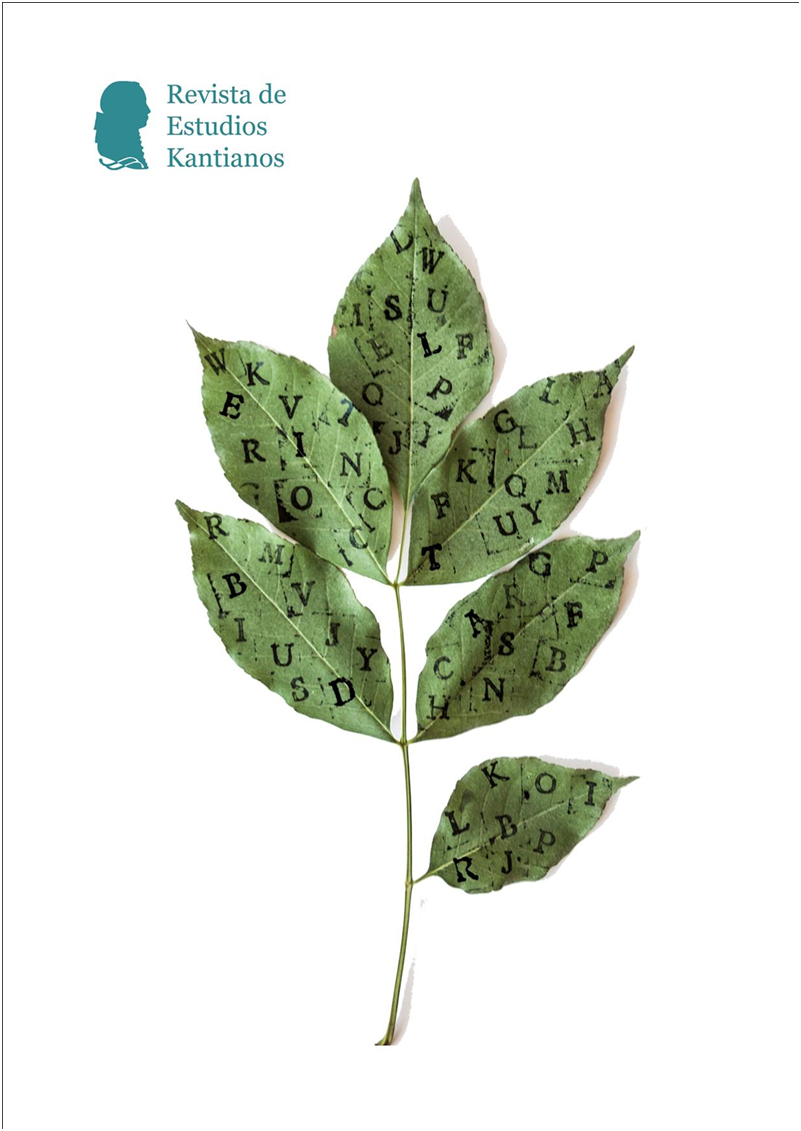Acerca de la estructura argumentativa de la Estética Transcendental
DOI:
https://doi.org/10.7203/REK.8.1.26488Palabras clave:
Estética transcendental, Espacio, Tiempo, Método analítico, Método sintético de argumentación, Intuición pura Resumen
Resumen
En este artículo se ofrece una interpretación de la estructura de la Estética Transcendental. La tradición ha considerado esta parte de la KrV como si se refiriera sólo al espacio y al tiempo, y no estudió suficientemente la estructura del argumento que se ofrece allí. Si se analiza tal línea argumentativa, se advierte que Kant sigue un método riguroso y preciso, combinación de sintético y analítico, que le permite partir de la afección, descubrir la sensibilidad, su materia, sus formas, y finalmente concluir que las nociones de espacio y tiempo son justamente las formas de la sensibilidad.
 Descargas
Descargas
 Citas
Citas
Adickes, E. (1929). Kants Lehre von der doppelten Affektion unseres Ich als Schlüssel zu seiner Erkenntnistheorie. J. C. B. Mohr.
Baum, M. (1991). Dinge an sich und Raum bei Kant”. En G. Funke (Ed.), Akten des Siebenten Internationalen Kant-Kongresses. Kurfürstliches Schloß zu Mainz, 1990 (pp. 63-72). Bouvier.
Blattner, W. (1995). The Non-Synthetic Unity of the Forms of Intuition in Kant's ‘Critique of Pure Reason’”. En H. Robinson (Ed.), Proceedings of the Eighth International Kant Congress, Memphis (vol. 2, pp. 169-177). Marquette Ubiversity Press.
Buchdahl, G. (1991). A Key to the problem of Affection”. En G. Funke (Ed.), Akten des Siebenten Internationalen Kant-Kongresses. Kurfürstliches Schloß zu Mainz, 1990 (pp. 73-90). Bouvier.
Caimi, M. (1982). Kants Lehre von der Empfindung in der Kritik der Reinen Vernunft: Versuch Zur Rekonstruktion Einer Hyletik der Reinen Erkenntnis. Bouvier.
Chenet, F.-X. (1993). Que sont donc l’espace et le temps? Les hypothèses considérées par Kant et la lancinante objection de la “troisième possibilité”. Kant Studien, 84, 129-153.
Dotti, J. (1989). Die Einwürfe der einsenhenden Männer. En G. Funke y T. M. Seebohm (Eds.), Proceedings of the Sixth International Kant Congress (vol. II, 1, pp. 3-18). The University Press of America.
Gómez, R. (1991). Science and Analytic Wholes. En G. Funke (Ed.), Akten des Siebenten Internationalen Kant-Kongresses. Kurfürstliches Schloß zu Mainz, 1990 (pp. 463-472). Bouvier.
Herz, M. (1990). Betrachtungen aus der spekulativen Weltweisheit. Neu herausgegeben, eingeleitet, mit Anmerkungen und Registern versehen von Elfriede Conrad, Heinrich P. Delfosse und Birgit Nehren. Felix Meiner.
Hinske, N. (1991). Die Wissenschaften und ihre Zwecke. Kants Neuformulierung der Systemidee. En G. Funke (Ed.), Akten des Siebenten Internationalen Kant-Kongresses. Kurfürstliches Schloß zu Mainz, 1990 (pp. 157-177). Bouvier.
Hintikka, J. (1973). Logic, Language-Games and Information: Kantian Themes in the Philosophy of Logic. Clarendon Press.
Kant, I. (1986). Briefwechsel. Auswahl und Anmerkungen von Otto Schöndörffer, bearbeitet von Rudolf Malter und Joachim Kopper [1873]. Felix Meiner.
Nagel, G. (1983). The Structure of Experience. Kant’s System of Principles. The University of Chicago Press.
Parsons, C. (1992). The Transcendental Aesthetic. En P. Guyer (Ed.), The Cambridge Companion to Kant (pp. 62-100). Cambridge University Press.
Paton, H. J. (1970). Kant's Metaphysic of Experience: A Commentary on the First Half of the Kritik der Reinen Vernunft [1936]. MacMillan/G. Allen & Unwin.
Pippin, R. (1982). Kant’s Theory of Form. An Essay on the Critique of Pure Reason. Yale University Press.
Pitte, F. V. de (1995). Kant's Problems with Space and Time. En H. Robinson (Ed.), Proceedings of the Eighth International Kant Congress, Memphis (vol. 2, pp. 179-186). Marquette University Press.
Riehl, A. (1924). Der Philosophische Kritizismus. Geschichte und System, vol. 1. [1876]. Alfred Kröner Verlag.
Torretti, R. (1980). Manuel Kant, Estudio sobre los fundamentos de la filosofía crítica, vol. 2. [1967]. Charcas.
Vaihinger (1970). Kommentar zu Kants Kritik der reinen Vernunft [1892]. Aalen.
Publicado
Cómo citar
-
Resumen478
-
PDF230
-
EPUB68
Número
Sección
Licencia
![]()
Los autores que publican en esta revista están de acuerdo con los siguientes términos:
- Los autores conservan los derechos de autor y garantizan a la revista el derecho de ser la primera publicación del trabajo al igual que licenciado bajo una Creative Commons Attribution License que permite a otros compartir el trabajo con un reconocimiento de la autoría del trabajo y la publicación inicial en esta revista.
- Los autores pueden establecer por separado acuerdos adicionales para la distribución no exclusiva de la versión de la obra publicada en la revista (por ejemplo, situarlo en un repositorio institucional o publicarlo en un libro), con un reconocimiento de su publicación inicial en esta revista.
- Se permite y se anima a los autores a difundir sus trabajos electrónicamente (por ejemplo, en repositorios institucionales o en su propio sitio web) antes y durante el proceso de envío, ya que puede dar lugar a intercambios productivos, así como a una citación más temprana y mayor de los trabajos publicados (Véase The Effect of Open Access) (en inglés).








